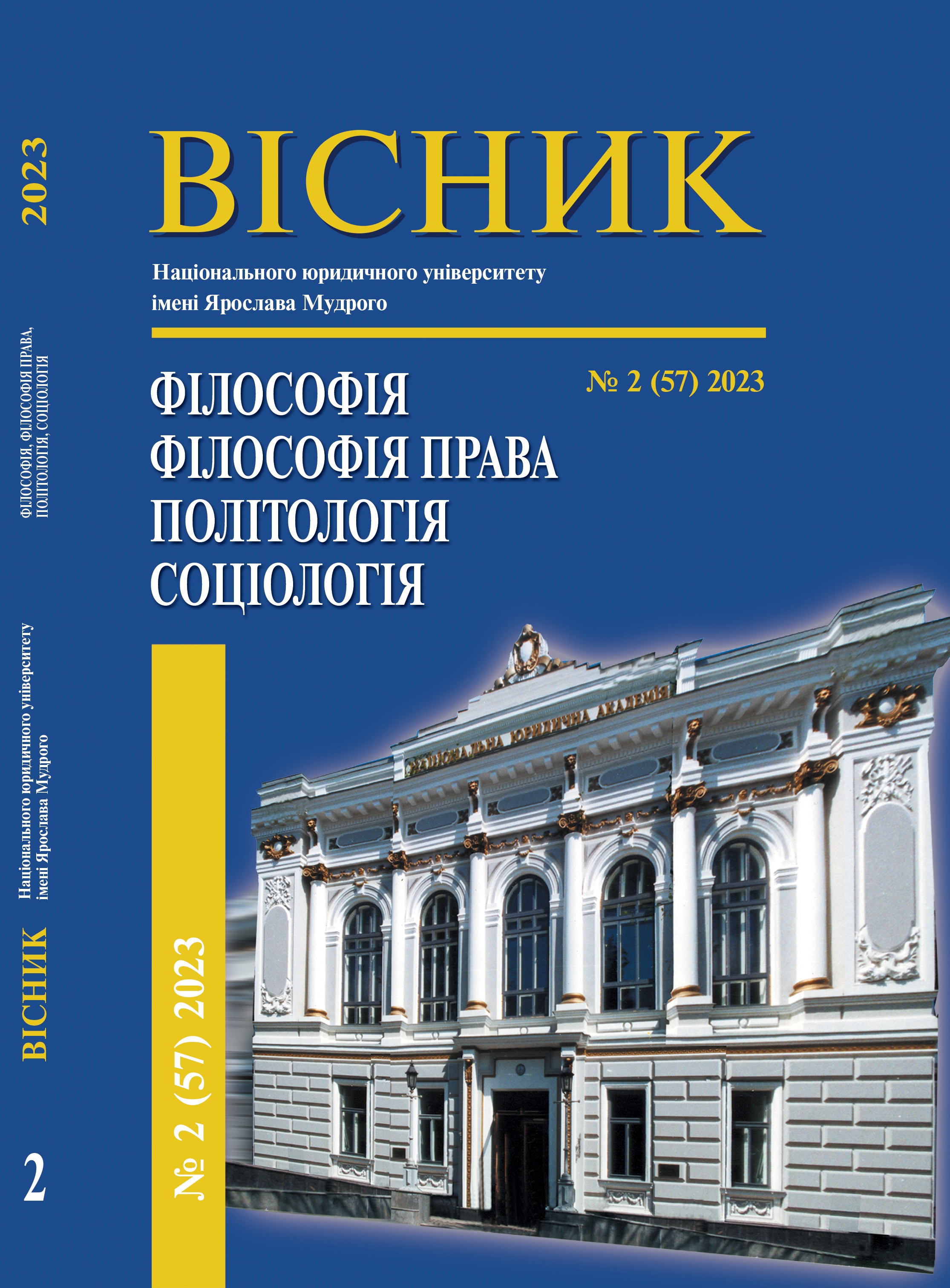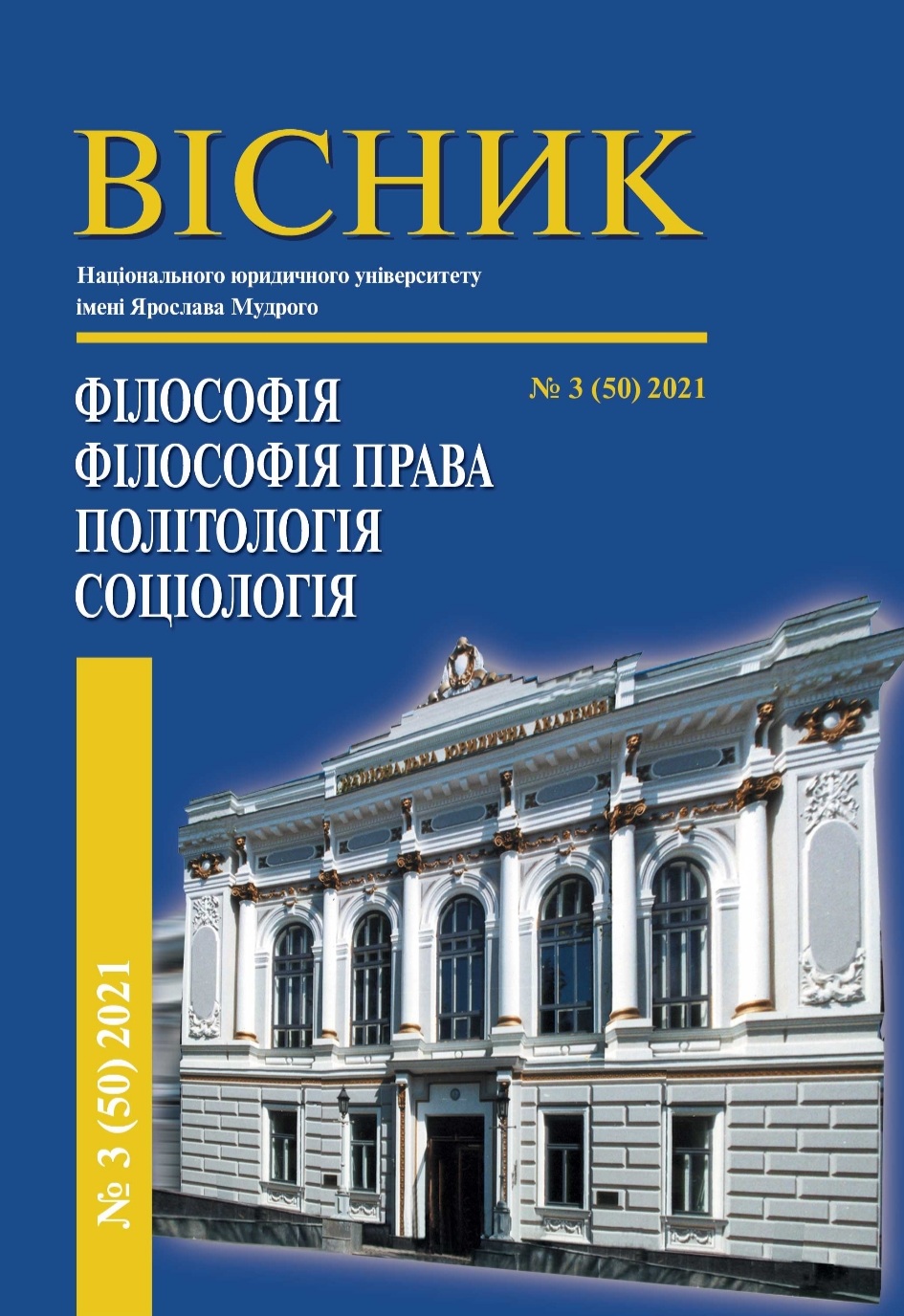ЕТИКА КРІЗЬ ПРИЗМУ ТІЛЕСНОЇ РАЦІОНАЛЬНОСТІ (ДО МЕТОДОЛОГІЧНОГО ІНСТРУМЕНТАРІЮ ФЕНОМЕНОЛОГІЇ)
DOI:
https://doi.org/10.21564/2663-5704.57.276662Ключові слова:
евристика тіла, чуттєве, тілесна раціональність, феноменологія, епістемологія, етика, конструктивізм, етика у практиках конструктивізмуАнотація
Стаття присвячена аналізу досліджень евристичних можливостей тілесного у сучасних феноменології та епістемології, що дає можливість більш ширшого розуміння раціональності, а саме – звернути увагу на феномен тілесної раціональності. Автор підкреслює, що тілесну раціональність необхідно оцінювати як одну із складових в інструментарії сучасної феноменології, і стверджує, що когнітивні смисли тілесної раціональності відкривають нові опції бачення та опису проблем в етиці.
Посилання
Merleau-Ponty, M. (1973). The Prose of the World. Evanston: Northwestern University Press.
Merleau-Ponty, M. (1964). The Primacy of Perception. And Other Essays on Phenomenological Psychology, the Philosophy of Art, History and Politics (Studies in Phenomenology and Existential Philosophy). Evanston: Northwestern University Press.
Arystotel. (1978). Soch. Vols. 4; Vol. 2. Moskva: Mysl, 687. [in Russian].
Gumbrecht, H. U. (2006). Presence production: What meaning cannot convey. Retrieved from http://www.history-library.com/index.php?id1=3&category=arhiologiya&autho r=gumreht-hu&book=2006
Sheets-Johnstone, M. (2016). Foundational Dynamics of Animate Nature. Intercorporeity, Movement and Tacit Knowledge (Zwischenleiblichkeit und bewegtes Verstehen). Publisher: transcript (Germany). P. 51‒67. doi: 10.14361/9783839435793– 003
Maturana, U. R., Varela, F. Kh. (2001). Drevo poznanyia. Byolohycheskye korny chelovecheskoho ponymanyia. Moskva: Prohress-Tradytsyia. [in Russian].
Uexküll, von J. В. (1982). The Theory of Meaning. Semiotica, 42, (1), 25–82.
Uexküll, J. B., Kriszat, G. (1956). Streifzüge durch die Umwelten von Tieren und Menschen. Ein Bilderbuch unsichtbarer Welten. Rowohlt Hamburg, 178 р. Retrieved from https://monoskop.org/images/1/1f/Uexkuell_Jakob_von_Streifzuge_durch_die_ Umwelten_von_Tieren_und_Menschen_Ein_Bilderbuch_unsichtbarer_Welten_1956. pdf
Emmeche, C., Kull, K. (2011). Towards a Semiotic Biology: Life is the Action of Signs. London: Imperial College Press. Retrieved from https://www.academia.edu/727564/ Towards_a_Semiotic_Biology_Life_is_the_Action_of_Signs
Hybson, Dzh. (1988). Эkolohycheskyi podkhod k zrytelnomu vospryiatyiu Moskva: KoLybry [in Russian].
Lakoff, G., Johnson, M. (1999). Philosophy in the Flesh: The Embodied Mind and its Challenge to Western Thought. New York: Basic Books.
Dolska, O. O. (2020). Ideia otilesnenoho («embodied») rozumu v yakosti obgruntuvannia tilesnoi ratsionalnosti. Visnyk Kharkivskoho natsionalnoho universytetu imeni
V. N. Karazina, seriia «Teoriia kultury i filosofiia nauky» ‒ The Journal of V. N. Karazin Kharkiv National University. Series: Theory of Culture and Philosophy of Science, 62, 7‒14 [in Ukrainian].
Brentari, C. (2015). Jakob von Uexküll. The Discovery of the Umwelt between Biosemiotics and Theoretical Biology. Biosemiotics. Dordrecht: Springer, 9, 21‒46. doi 10.1007 / 978-94-017-9688-0
Butler, J. (1993). Bodies That Matter: On the Discursive Limits of «Sex». New York and London: Routledge.
Butler, J. (1990). Gender Trouble: Feminism and the Subversion of Identity. New York and London: Routledge.
Chernykova, Y. (2011). Typolohyia nauky v kontekste sovremennoi fylosofyy nauky.
Voprosи fylosofyy ‒ Questions of Philosophy, 11, 71‒78 [in Russian].
Dolska, O. (2020). Time to Think About Embodied Rationality (The Stands of the Sporting Events Are Empty!). Mokslas ir praktika: Aktualijos ir perspektyvos. Mokslinių
straipsnių rinkinys. ‒ Theory and practice: Problems and prospects. Scientific articles. Kaunas: Lietuvos sporto universitetas, 37‒46. Retrieved from http://dspace.lsu.lt/ handle/123456789/78
Dolska, O., Lobas, V. (2021). Embodied rationality as a mode of the visibility of Ethics (to the question of the toolkit of Constructivism). Filosofiya-Philosophy, 30 (2), 126‒138.
Dolska, O. O., Fu, Khun. (2021). Fenomenolohichno-epistemolohichnyi vymir subiektyvatsii. Visnyk Kharkivskoho natsionalnoho universytetu imeni V. N. Karazina, seriia «Teoriia kultury i filosofiia nauky» ‒ The Journal of V. N. Karazin Kharkiv National University. Series: Theory of Culture and Philosophy of Science, 63, 47‒56. doi: https://doaj.org/toc/2306–6687?source [in Ukrainian].
Hay, C. (2016). Good in a crisis: the ontological institutionalism of social constructivism. New Political Economy, 21 (6), 520‒535. doi: http://dx.doi.org/10.1080/13563467.20 16.1158800
Butt, T. (2000). Pragmatism, Constructivism, and Ethics. Journal of Constructivist Psychology, 13 (2), 85‒101. doi: http://dx.doi.org/10.1080/107205300265892
Riegler, A. (2005). Editorial. The Constructivist Challenge. Constructivism Foundations, 1 (1), 1‒8. doi: http://constructivist.info/1/1/001
Raskin, J. D. (2018). Constructivism, Ethics, and Knowing What’s Right: A Reply to McNamee, Burr, McWilliams, Osbeck, and Held. Journal of Constructivist Psychology, 31, (4), 413‒419. doi: https://doi.org/10.1080/10720537.2017.1383956
Dekart, R. (1989). Pervonachala fylosofyy. Soch. Vols. 1–2; Vol. 1. Moskva: Mysl [in Russian].
Le Hoff, Zh., Triuon, N. (2016). Ystoryia tela v Srednye veka. Retrieved from http://www.litres.ru/pages/biblio_book/?art=3027205 [in Russian].
Sheets-Johnstone, M. (2008). The Roots of Morality. University Park, PA: State University of Pennsylvania Press. Retrieved from https://dl.uswr.ac.ir/bitstream/ Hannan/130902/1/Maxine_Sheets-Johnstone-The_Roots_of_Morality-Pennsylvania_ State_University_Press%282008 %29.pdf
Baird, T. E. (2018). Interest groups and strategic constructivism: business actors and border security policies in the European Union. Journal of Ethnic and Migration Studies, 44 (1), 118‒136. doi: http://dx.doi.org/10.1080/1369183X.2017.1316185




